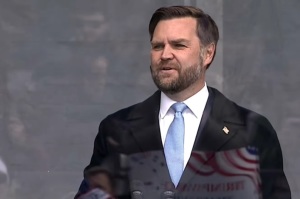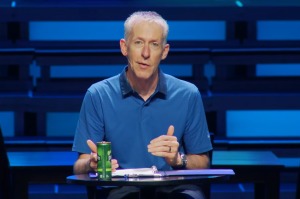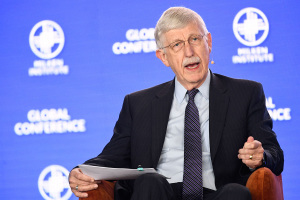Book Review: Andy Stanley's Troubling Rules on Love, Sex, and Dating

As I stumble through the awkward limbo of single, yet soon-to-be-married, I've tried to read every resource tagged within the "marriage," "love," and "relationships" genre. This, and the fact that I was desperate to escape the zillions of online articles dissecting Fifty Shades of Grey from every possible angle (though I'm grateful for their messages), prompted me to download a copy of Pastor Andy Stanley's new book on romantic relationships to my Kindle. It seemed like a good idea at the time.
Geared towards the young, unwed, and culturally savvy, Stanley explains in the introduction that his purpose for writing The New Rules for Love, Sex, and Dating (Zondervan, January 2015) is to "increase your relational satisfaction quota." What does that mean? Red flags started to rise. Still I pressed onward with hopes of encountering helpful gems of wisdom and Christian counsel over the next 200 pages. After all, the author is the Evangelical pastor of the largest church in America.
I'll start with the positive.
The book's strength lies in providing clarity on the idea that love is an action, not an emotion. While presenting I Corinthians 13:4-8, Stanley moves slowly through each of the Apostle Paul's love descriptors careful to paint a clear picture of what love looks like when it is "not easily angered" or "rejoices with truth." By using Scripture—an overall rare occurrence in this book—Stanley creates an easily digestible to-do and not-to-do list with practical, contemporary examples that squash the fairytale "love" narratives inundating our culture. For this section, I was grateful.
I was disappointed with Stanley's book for a couple reasons, the first being its lack of depth. Undoubtedly, he has provided Bible-based premarital and martial counseling to thousands of struggling couples. But instead of pastoral counseling, readers are offered endless clichés like, "the right person doesn't always act right," "your relationship will never be healthier than you," and "fix your pet, not your partner."
Stanley does expound on his amusing sound bites, but prefers to draw from clever anecdotes and humorous stories rather than Scripture. For example, in the second chapter he explains that "preparation is more important than commitment" when it comes to marriage. Stanley wrote, "Most people are content to commit. When it comes to relationships, commitment is way overrated." An odd statement, especially since Stanley nodes towards America's high divorce rates in the previous chapter.
"Don't get nervous. I don't believe church people are the only ones preparing to commit." He continues, "Church happens to be my context. Online dating services provide a similar context." Likely Stanley does not intend to convey to his readers that it is unnecessary to finding someone who shares your faith so long as you prepare for marriage well by paying off your debt, breaking bad habits, and addressing past experiences. However, his ambiguity threaded throughout his book actually does more harm than good.
Here's why.
I committed to reading this book from cover to cover and as Stanley jumped head first into debunking myths like "maybe a baby will help?" I wanted to apply the brakes and demand a wiser starting point. If marriage is the end goal for love, sex, and dating—and presumably Stanley would agree that it is—then a helpful launching pad would be to examine the purpose and parameters of this covenant before moving forward.
I'm grateful that Stanley tackles other tough issues like sexual purity before marriage and how to explain biblical submission to our friends. But if readers don't have a foundational understanding of the moral implications of the marriage covenant, then the rest of the discussion is pointless.
This is the most troublesome part of Stanley's book. It fails to lay out clearly the sanctity of marriage and its divine purpose, which has to do with much more than fulfilling our "relational satisfaction quotas." As a pastor, it is disappointing that he avoids Genesis 2, which clearly lays out the purpose of marriage, namely, that it is a covenant relationship between one man, one woman, and God.
As hard as it is to admit, America's most influential pastor will not define or defend the sanctity of marriage because he doesn't want to upset anyone. So he seems to compromise his teachings by insinuating that Jesus would probably bake a cake for a same-sex wedding couple and therefore Christians should too.
Stanley's move away from orthodoxy more evident while discussing his new book with Religion News Service's Jonathan Merritt. During the interview, Merritt asked Stanley why he did not address the LGBT community in The New Rules on Love, Sex, and Dating. We might expect an Evangelical pastor's answer to explain that he did not address this community because LGBT lifestyles do not fit the parameters of marriage as God defined it. Stanley's answer was quite different. "I met with about 13 of our [church's] attenders who are apart of the LGBT community… It was unanimous that they thought it was helpful and shared some of the stuff they learned."
Sadly, Stanley's new book does little to ease the bubbling concerns of faithful Christians listening to the Georgia pastor's provocative sermons and statements coupled with questionable silence on unorthodox teachings. (If you have not yet read Alexander Griswold's exposé "Andy Stanley's Troubling New Sermon," I urge you to do so.)
While Stanley does not blatantly deviate from historic Christian teaching on the subjects discussed (in the book, at least), he does little to define or defend their divine purpose within its pages. As A.W. Tozer, an Evangelical thinker and teacher, wrote, "He believes it, but he doesn't teach it, and what you don't believe strongly enough to teach doesn't do you any good." Nor does it do his readers any good, I might add.



























